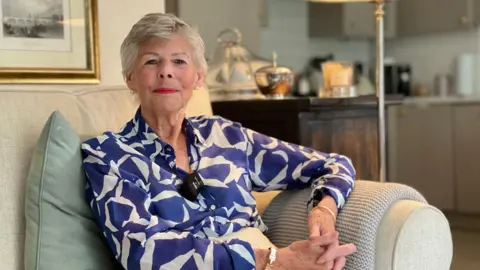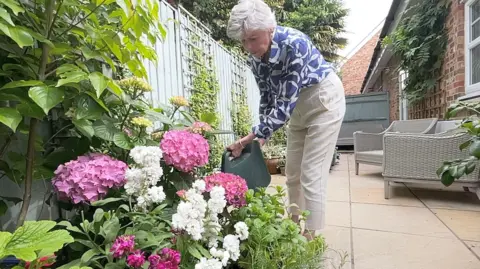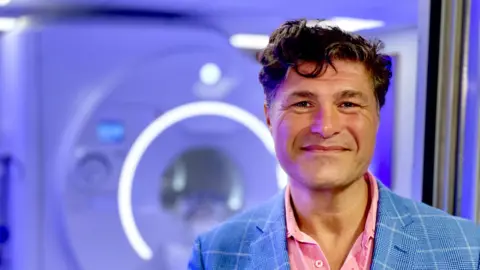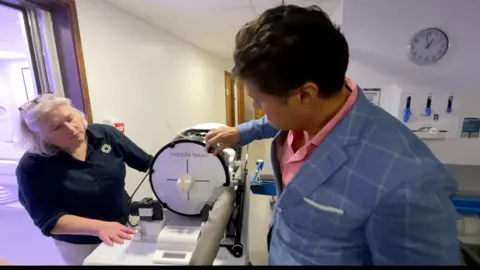'My life was transformed by tremors treatment'
 BBC/Mark Norman
BBC/Mark NormanA Surrey woman who underwent ultrasound treatment for a neurological condition that left her struggling to eat or drink has hailed the procedure as "magic".
Mary Hapgood, 72, from Cobham, Surrey, said her life had been "completely transformed" after doctors used sound waves to operate deep inside her brain.
It comes as the neurosurgeon who carried out the non-invasive procedure for essential tremor (ET) called for the treatment to be rolled out to more NHS hospitals.
An NHS spokesperson said two centres which had been commissioned to provide the treatment would "provide sufficient capacity to meet national demand".
The condition causes involuntary shaking of parts of the body and affects over a million people in the UK, but new research has highlighted an ongoing lack of understanding.
The National Tremor Foundation said ET is considered one of the most common neurological movement disorders and is estimated to be eight to 10 times more prevalent than Parkinson's disease.
But 70% of people living with ET hadn’t heard of it prior to diagnosis.
It can sometimes be treated with drugs, which can have serious side effects, or with brain surgery, but this carries the risk of stroke and infection.
 BBC/Mark Norman
BBC/Mark NormanMs Hapgood lived with ET for 50 years and the condition slowly worsened over time.
She says before the treatment "it would have been very obvious", with her hands "flapping in the wind"
Eating and drinking became highly stressful because she could not get her hand to her face without shaking.
But she was able to avoid the need for surgery with the MRI guided focused ultrasound treatment.
As part of the treatment, MRI scanners are combined with powerful ultrasound waves which target very small parts of the brain.
 BBC/Mark Norman
BBC/Mark NormanProf Ludvic Zrinzo, at University College London Hospitals NHS Trust's National Hospital for Neurology and Neurosurgery, specialises in the surgical management of chronic neurological disease including tremor.
"I don't need to polish my knife or get my scalpel out... but I'm still going deep into the brain in a very precise way minimising the risks and improving patient outcomes," he said.
The treatment is currently only available at two NHS centres, with patients waiting up to five years for focused ultrasound treatment on the NHS.
 BBC/Mark Norman
BBC/Mark Norman"That is not enough, there are clearly too many patients and these centres are being overwhelmed," said Prof Zrinzo.
"We are very keen that the equipment we have at The National Hospital is commissioned by the NHS and we're working with commissioners for this to happen."
Ms Hapgood echoed his call. "I think there should be more MRI scanners. I am really supporting this having been through that awful time in my life when everything I did was shaking, it's really awful," she said.
But the NHS spokesperson said it had commissioned the two specialised centres based on the estimated 50 to 150 patients a year who were eligible for the treatment.
“Based on current referral numbers and activity within the service, the two centres will provide sufficient capacity to meet national demand and this will continue to be monitored," they added.
Follow BBC Surrey on Facebook, on X. Send your story ideas to [email protected] or WhatsApp us on 08081 002250.
